Level 3 Diploma in Zookeeping
MAKE AN ENQUIRY
| Ofqual Code | 610/3324/8 |
|---|---|
| Qualification Level | 3 |
| Guided Learning Hours | 297 |
| Practical Locations | 1 week of practical training at either: Blackpool Zoo, Dartmoor Zoo, Colchester Zoo or Jimmy's Farm and Wildlife Park. |
| Total Qualification Time | 370 hours |
| Start Date | Anytime |
| Award type | Diploma |
| Assessment Method | Variety of in-depth assessments for each unit |
| UCAS Points | Contributes to UCAS points* |


The Level 3 Diploma in Zookeeping is an ideal qualification for working or volunteering in zoos or for working with wildlife in captivity in zoos, safari parks, and wildlife collections. The theory is studied online from home, at your own pace and with full tutor support.
The optional practical training consists of 1-week training at either;
Dartmoor Zoo, Colchester Zoo, Blackpool Zoo, Jimmys’ Farm and Wildlife Park.
This is a fantastic opportunity to gain experiential learning with a variety of species.
This zookeeper diploma is open to anyone aged 16 or over. No prior qualifications are necessary. Please note, that accommodation and food are not included in the course fees. Course fees must be paid in full prior to attending the practical placement.

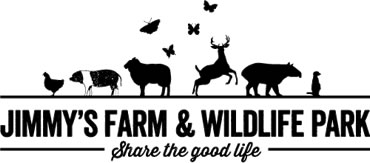
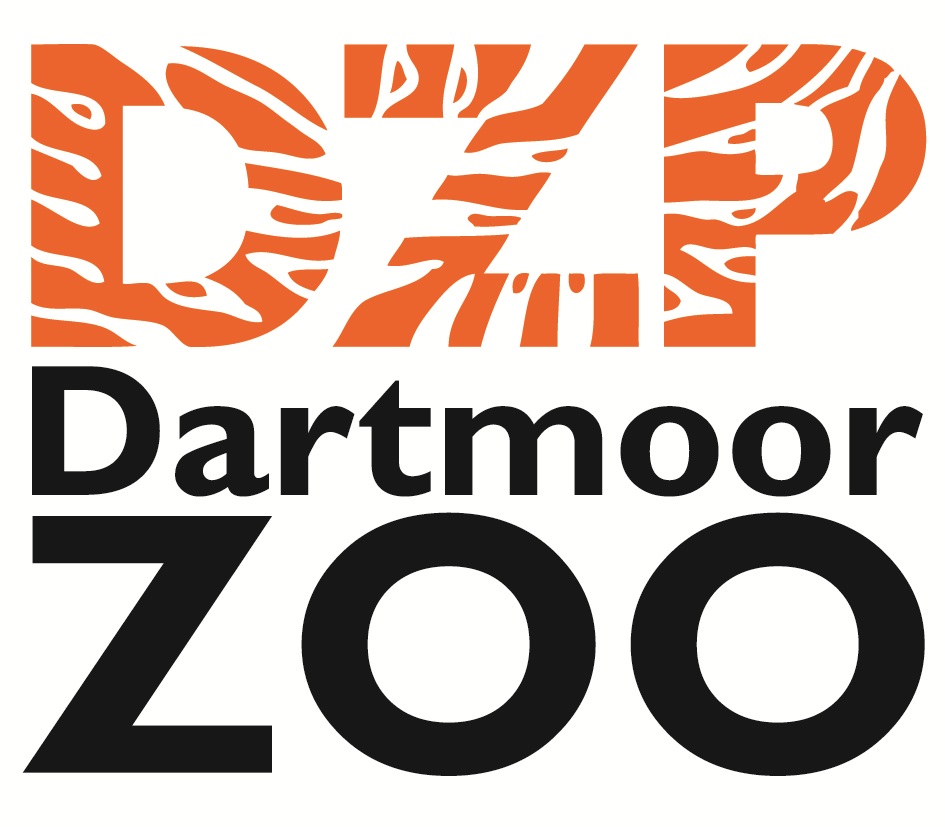
Zookeeping Qualification Reviews
What will you remember about your 5 days of practical zoo training?
 “Meeting amazing and ‘like minded’ people. Meeting the Keepers who are dedicated to animals and helping people understand them. The amazing social side of the zoo and helping the fantastic animals.
“Meeting amazing and ‘like minded’ people. Meeting the Keepers who are dedicated to animals and helping people understand them. The amazing social side of the zoo and helping the fantastic animals.
Now that I am more knowledgeable and have more experience with different animals, it has made me even more passionate about protecting animals. Through talking to my trainer, I’ve learned that my options are greater than I originally thought.”
Did the Level 3 in Zookeeping Qualification meet all of your expectations?
 “Met and exceeded my expectations about the friendliness of the group and of the keepers. It was a lot more hands on than expected and with more species than expected! I came with an open mind and this week has been a dream: I have loved everything and do not want to go back to reality. I want to be a zoo keeper now.”
“Met and exceeded my expectations about the friendliness of the group and of the keepers. It was a lot more hands on than expected and with more species than expected! I came with an open mind and this week has been a dream: I have loved everything and do not want to go back to reality. I want to be a zoo keeper now.”
More Reviews of the Level 3 in Zookeeping Qualification
 “Thoroughly recommend the course and The Zoo as placement. I wouldn’t change anything from the week. This course has helped me mentally and physically. I want to dedicate my like to animals. I know I can do it now. Thank you for everything. I will remember this week forever. Unforgettable.” – Level 3 Zookeeping Student
“Thoroughly recommend the course and The Zoo as placement. I wouldn’t change anything from the week. This course has helped me mentally and physically. I want to dedicate my like to animals. I know I can do it now. Thank you for everything. I will remember this week forever. Unforgettable.” – Level 3 Zookeeping Student
 ‘Since starting the course I have obtained two volunteering positions one in a zoo, another in a rescue centre and I am already looking into where to go next with my studies’……..”.
‘Since starting the course I have obtained two volunteering positions one in a zoo, another in a rescue centre and I am already looking into where to go next with my studies’……..”.
 “I cannot recommend this team and course enough. They have all been so welcoming to myself and my team this week from Animal Courses Direct. I feel like we have all learned so much during our zoo keeper training and the practical experience has been absolutely amazing. We have experienced everything so hands on and I feel really lucky to have been able to come to such a special zoo for this. Special shout out to Harry who has put up with us all week and taught us so much, he is excellent at what he does. I know things that we have discussed will stick with me and make the rest of the course so much easier. Thank you.” Luke B, Student.
“I cannot recommend this team and course enough. They have all been so welcoming to myself and my team this week from Animal Courses Direct. I feel like we have all learned so much during our zoo keeper training and the practical experience has been absolutely amazing. We have experienced everything so hands on and I feel really lucky to have been able to come to such a special zoo for this. Special shout out to Harry who has put up with us all week and taught us so much, he is excellent at what he does. I know things that we have discussed will stick with me and make the rest of the course so much easier. Thank you.” Luke B, Student.
Please click here for more of this students’ review of our Zookeeper qualification
Animal Courses Direct students talking about their 1 week practical course at a Zoo
Unit 1
Zoos in History
Learners will look back at how zoos operated historically and compare them to modern day zoos. This will enable learners to see how far animal welfare has come, and how to move practices forward to continue to improve the lives of zoo animals in captivity.
Unit 2
Zoological Conservation
Learners will evaluate conservation in zoos, including the ethics and welfare of keeping animals, breeding programmes, and the methods used both nationally and internationally to enhance the gene pool and protect animals from extinction.
Unit 3
Zoo Enclosure Design and Improvement
Learners will be provided with information on the design and improvement of zoo animal enclosures to improve and maintain welfare, bearing restrictions imposed in mind.
Unit 4
Legislation in Zoos
Learners will learn about Legislation and Organisations involved in zoological collections and zoo animal care forms a large part of a Zookeeper’s jurisdiction. Learners will explore the impact that relevant Legislation and Organisations have on the role of a Zookeeper in a modern day zoo.
Unit 5
Education in Zoos
With education being an integral part of zookeeping, learners will explore their role in providing and participating in education for the benefit of themselves and the wider community.
Unit 6
The Role of the Media in Zoos
Learners will learn the skills on how to turn media coverage into a positive impact on zoos. It is important for learners to understand how to deal with the media in a positive and impactful way whilst ensuring no confidential information is leaked.
Unit 7
Zoo Animal Nutrition
Learners will understand the basics of animal nutrition and how it enables Zookeepers to provide accurate diets and correctly presented food to zoo animals and ensures their welfare and enrichment.
Unit 8
Zoo Animal Management
Learners will understand how working as part of an effective team in a zoo is directly linked to the welfare of the animals within it. Learners will explore observation skills, record keeping and having a multi-disciplinary approach to zookeeping and animal welfare.
Unit 9
Zoo Animal Health
Learners will look at the ways in which good health is indicated in zoo animals – both physically and behaviourally, and the importance of prevention of diseases.
Unit 10
Zoo Animal Enrichment
Learners will look at the different ways to provide enrichment to zoo animals, and the importance of doing so. Learners will know the issues that could occur with lack of enrichment being provided and how it is integral to the welfare and public’s perception of the zoo.
Unit 11
Stress in Zoo Animals
Stress can have a massive impact on the welfare of animals in a zoo. This unit looks at reasons for stress in animals and how to minimise exposure to stress to ultimately improve welfare.
Unit 12
Animals in Captivity
Learners will explore the welfare of animals kept in captivity and methods of assessing welfare standards, including how to improve welfare. Looking at the reasons that animals are kept in captivity and how to ensure they are fulfilled, learners will have a balanced view on reasons for and against keeping animals in captivity, and the ethics of breeding.
Unit 13
Practical Placement Venues
The practical training consists of 1 week training at Dartmoor Zoo, Blackpool Zoo, Colchester Zoo or Jimmys’ Farm and Wildlife Park. This is a fantastic opportunity to gain experiential learning with a variety of species.
Please note that dates for the practical training will be provided upon enrolment
Course Options
Self-Paced Online Learning With Tutor Support
- Access your course materials immediately
- Tutor support via our market-leading platform
- Study around existing commitments
- Progress as quickly as you’d like
- Tailored individual learning plan to help you succeed
- Engaging content; from videos to interactive quizzes
- Industry-leading 14 days marking turnaround
Self-Paced Online Learning With Tutor Support PLUS On-Demand & Live Classes
- Live classes are scheduled between 10am to 8pm - days of the week vary (to include weekends)
- Access to our video library of previous lectures available on-demand
- Interact with your tutors directly during your class
- Take live classes multiple times or access recordings as you like
- Tutor support via our market-leading platform
- Study around existing commitments
- Progress as quickly as you’d like
- Tailored individual learning plan to help you succeed
- Engaging content; from videos to interactive quizzes
- Industry-leading 14 days marking turnaround
Animal Courses Direct students on their practical placement at Zoos.
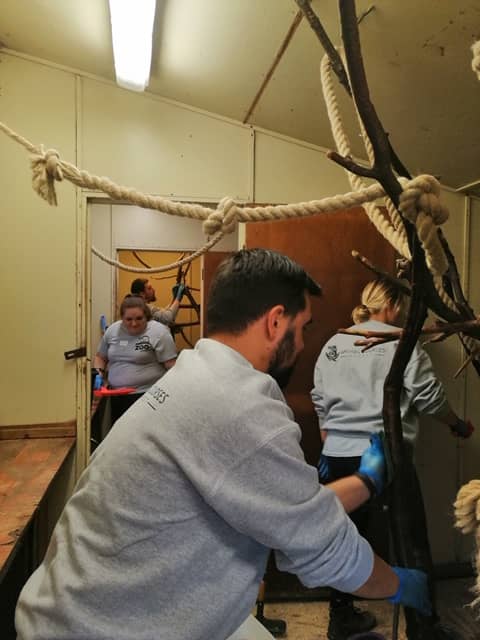
Learning about Enrichment
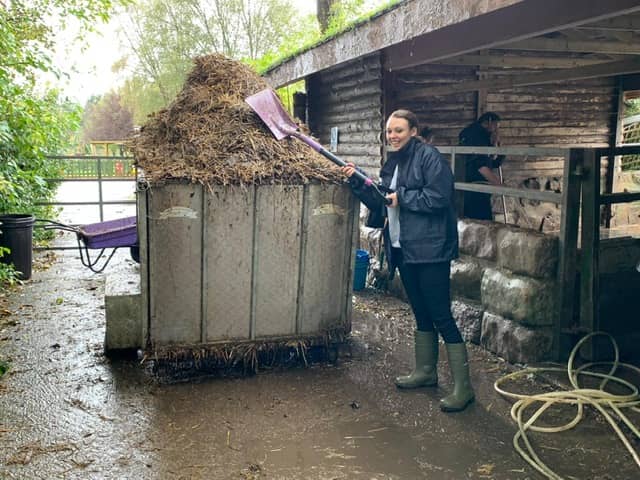
Cleaning animal enclosures
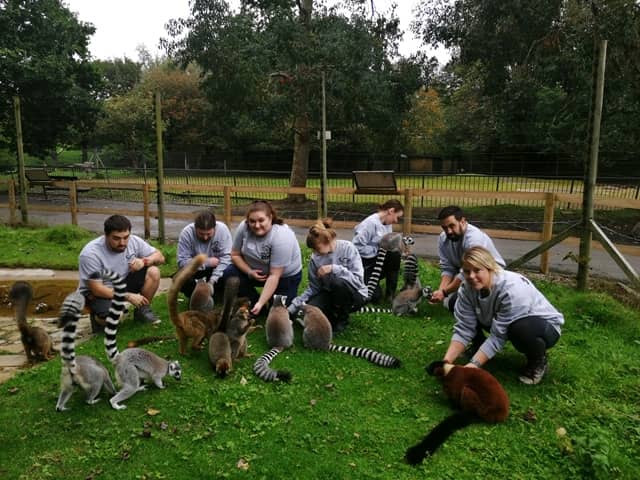
Handling and Welfare
ZSL Fellowship

When you study a wildlife, zoology or conservation course with Animal Courses Direct, you will be eligible to apply for ZSL Fellowship. Fellows get unlimited access for them and a family guest to ZSL London and Whipsnade Zoos plus borrowing rights in the extensive ZSL library of rare zoological texts. Enrol on your course and apply directly to ZSL for Fellowship.
Enrichment for Animals in Captivity
There is a multitude of variables that determine whether a species will respond well or otherwise to captivity. Size of accommodation is one aspect and this is probably the most important consideration for the physical, emotional and mental well-being of all the zoo animals. Birds kept in captivity rarely have the opportunity to fly to their full extent unless kept in multi-species aviaries. To analyse enclosure designs, we need to consider the species that will be housed within a given enclosure and the management of the enclosures including what parts of the design match species’ needs and what areas match the needs of management.
All wild animals in captive situations will, at some point, need to be handled, transported, treated and restrained. These situations will require special practices. Animals may require moving from one enclosure or collection to another, they may have escaped and need capturing or they may need routine or non-routine veterinary attention. It may also be a requirement to isolate animals, possibly for quarantine purposes and therefore animals may need to be handled, restrained and transported to an isolation enclosure at some point in their captive lives.
The methods of handling and restraint differ greatly depending on the species, especially its size and temperament. Safety of the handler and the animal are paramount at all times and the need for handling and/or restraint should always be carefully considered.
It is important to note that handling and restraining wild animal species is a much more complex and stressful process as opposed to handling domestic companion animals. Wild animals are far more susceptible to stress and injury than domestic species, particularly during capture, handling, restraint and transportation. Even apparent simple procedures such as blood collection or clinical examination can significantly jeopardise the health and welfare of a wild animal. It is for this reason that the methods of handling and restraining wild animals need to be fully understood and appreciated prior to these methods occurring.
Start Your Career with this Zookeeper Training Qualification
There are a great many jobs involving the care of zoo animals. These include zookeepers, wildlife rangers, zoologists, habitat designers, curators, zoo vet assistants, zoo horticulturists, education officers, presenters, wildlife park keepers etc.
This zookeeper qualification has been designed in consultation with employers, to enhance career and employment prospects working in zoos and safari parks. There is a strong emphasis on the welfare of animals in captivity and the essential environmental enrichment requirements. This zookeeper qualification explores how to put animal welfare as a priority whilst allowing for clear management techniques and the public’s enjoyment of the zoo.
There are a wide range of wild animals housed in zoos, ranging from reptiles, big cats, and endangered species, including rhinos, primates, carnivores and many more. This diploma will give you a thorough basic knowledge and understanding of how to look after these amazing animals in captivity and how to conserve them for the future.
Learn about zoo animal care, history of zoos, animal behaviour, animal classification, captive environmental enrichment and stress reduction, animal welfare in zoos, wildlife conservation, record keeping, zoo legislation, zoo habitat design, nutrition and feeding animals in captivity, animal handling and more!
Register My Interest

GET YOUR NUS EXTRA/ TOTUM CARD
All students who complete qualifications from level 3 or above are eligible for the NUS extra / Totum Card, which gives you access to over 200 UK student discounts with brands like Co-op, Amazon and ASOS. Apply and find out more at https://www.totum.com/
















